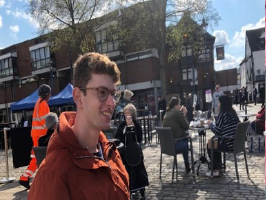Profile - PGT alum William Harrop
Having just graduated in his MA, William reflects on the course and why he chose Warwick for postgraduate study.
Are there any academics in particular that stood out to you when you were considering applying to Warwick?
Yes – I spotted Katayoun Shafiee as her research interests were well aligned with mine so I thought it would be really cool to have her as a supervisor (and she later was for my dissertation).
What did you particularly enjoy about your course?
I really enjoyed the module on science technology and society, Themes in the History of Science taught by Dr James Poskett. It was fascinating, it looked at how science has been shaped by society in all these different ways. It made me think about science in ways I wouldn't have before entering the course, and was very influential on my dissertation.
Do you have any advice for someone looking at postgraduate study?
I think it's important when considering a Masters to make sure you like both the course and the department as both are important. And make the most of the opportunities offered. When you're a postgrad, you get given the opportunity to go to research seminars and events every week and see these really interesting papers being presented so make the most of that.
Why did you choose to study history?
I've been interested in history since primary school. I had some really great teachers at sixth form so going to university was something I’d always wanted to do.
I chose to take it to postgraduate level because I’d enjoyed my undergraduate studies so much. I wanted to see how far I could take it, to see if I wanted to do a PhD. Also, there were a lot of topics and themes that I wanted to explore a bit more, that I didn't really get the chance to do as an undergraduate.
How has history informed your thinking about the world in the future?
Studying history provides important context for why things are the way they are today. To give an example, last year I wrote an essay on the colonial origins of the environmental movement and how historically, indigenous people and knowledge have been marginalised in discussions about conservation in favour of economic growth and industrialisation.
It helped me to understand why last year’s COP26 summit achieved less than it could have, as lots of indigenous people (for example from South America) were not included in the discussions.
How can history prepare us for the future?
History provides context for the present. You can spot warnings and the reasons for failures in the past.
When I was writing my previously mentioned essay on ‘colonial origins’, I studied the 1972 UN conference on climate change. That was illuminating because a lot of the things they were discussing and the reasons why it wasn't as successful as hoped continue to inform future UN conferences on climate change and the environment.
If you could meet one historical figure, who would that be and what would you ask them?
I think it would be most interesting to meet Gamal Abdel Nasser who was the president of Egypt during the Suez crisis of 1956. I'm interested in the history of the Middle East in the 20th century, and he was such an influential figure.
I would be interested to know more about his dealings with Anthony Eden, the British Prime Minister at the time, and his general worldview about pan-Arabism.
What would you say to someone thinking about studying history at Warwick?
I would definitely recommend it. The department is really friendly and there's a lot on offer in terms of the research specialisms. There is literally something for everyone: from the history of food to the history of science. It's just a really great place to study.
What’s next for you?
I start work in the Department of Trade and Industry in March 2022. And I’m looking forward to coming back to celebrate my graduation and see the new Faculty of Arts Building in Summer 2022.
Check out William’s piece on the Global History and Culture Centre Blog.
Cotton, Expertise and the End of Empire in the Aden Protectorate.

